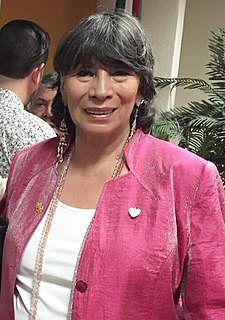Related Research Articles

Alatriste is a 2006 Spanish epic historical fiction war film directed by Agustín Díaz Yanes, based on the main character of a series of novels written by Arturo Pérez-Reverte, The Adventures of Captain Alatriste.

Amigas y rivales is a Mexican juvenile telenovela produced by Emilio Larrosa for Televisa in 2001. On Monday, February 26, 2001, Canal de las Estrellas started broadcasting Amigas y rivales weekdays at 7:00pm, replacing Primer amor, a mil por hora. The last episode was broadcast on Friday, November 9, 2001 with El juego de la vida replacing it the following Monday.

Angélica Espinoza Stransky, known as Angélica Aragón, is a Mexican film, television and stage actress and singer. She is daughter of the Mexican composer José Ángel Espinoza "Ferrusquilla". She is recognized for her performances in various Mexican film productions such as Cilantro y perejil (1997), Sexo, pudor y lágrimas (1999) and El crimen del Padre Amaro (2002) and in diverse American productions like A Walk in the Clouds (1995) and Dirty Dancing: Havana Nights (2002) among others. She is also famous for having starred in two famous Mexican telenovelas: Vivir un poco (1985) and Mirada de mujer (1997).
The XLVII Award of the Premio Ariel (2005) of the Academia Mexicana de Artes y Ciencias Cinematográficas took place on March 29 of 2005 at the Palacio de Bellas Artes. The Premio Ariel for the best movie was awarded to Temporada de patos.

María Ofelia Medina Torres is a Mexican actress, singer and screenwriter of Mexican films. She was married to film director Alex Philips Jr. and actor Pedro Armendáriz Jr.
Azela Robinson is a Mexican actress of British origin. Famous for her antagonistic interpretations in numerous Mexican telenovelas, among which are Cañaveral de pasiones (1996), Contra viento y marea (2005), Llena de amor (2010) and Yo no creo en los hombres (2014), among many others.

María Gertrudis Teodora Bocanegra Mendoza was a woman who fought in the Mexican War of Independence. She was arrested, tortured and executed in 1817.

Mauricio Feres Yázbek, known professionally as Mauricio Garcés, was a Mexican actor and comedian.
The Golden Ariel is an award that “symbolizes the work of excellence that a member of the film industry has achieved throughout their career and that has contributed to the development and growth of Mexican cinematography”. The Golden Ariel is the highest award given to an individual or institution in the Mexican film industry by the Mexican Academy of Cinematographic Arts and Sciences. It has been awarded annually since 1946 as part of the Ariel Awards and is also given to films that win Best Picture. As of 2020 ceremony, the current recipients are composer Lucía Álvarez and actress María Rojo.

Mónica Miguel was a Mexican actress, director, and singer.
Rosa Furman Epstein was a Mexican actress.

Fanny Schiller Hernández was a Mexican award-winning character actress and television star, who also acted in operettas and musicals, during the Golden Age of Mexican cinema. She won two Ariel Awards for best supporting actress, and was nominated for two additional films. She was a social activist, creating the Actor's Union and inspiring the creation of “Rosa Mexicano”. She was accomplished at dubbing and was the voice of many animated characters as well as the official voice of several other notable Mexican actresses.

Leonor Llausás Tostado was a Mexican television and film actress who appeared in over 100 works of film and television. She was nominated multiple times for the Ariel Awards and won a Best Actress award in 1955 from the film Los Fernandez we peralvillo, in 1975 won Diosa de Plata for Las poquianchis. She also was awarded the "Virginia Fabregas" medal of honor by the Mexican National Association of Actors.

Secretos de Familia is a Mexican telenovela, remake of Brothers & Sisters by Azteca in 2013. In January 2013, confirmed cast included Sergio Basañez and Anette Michel as the protagonists. From May 13 to October 4, 2013, Azteca 13 aired Secretos de Familia, replacing La Otra Cara del Alma.
Bianca Vidal is a Mexican telenovela produced by Valentín Pimstein for Televisa in 1982. Bianca Vidal was based on the soap opera María Salomé, original of Inés Rodena which was then elongated by Sacrificio de mujer from the same author.

De frente al sol, is a Mexican telenovela produced by Carla Estrada for Televisa in 1992.
The Ariel Award for Best Supporting Actress is an award presented by the Academia Mexicana de Artes y Ciencias Cinematográficas (AMACC) in Mexico. It is given in honor of an actor who has delivered an outstanding performance in a supporting role while working within the Mexican film industry. In 1947, the 1st and 2nd Ariel Awards were held, with Lilia Michel winning in both ceremonies for the films Un Beso en la Noche and Vértigo, respectively. With the exception of the years 1959 to 1971, when the Ariel Awards were suspended, the award has been given annually. Nominees and winners are determined by a committee formed every year consisting of academy members, previous winners and individuals with at least two Ariel nominations; the committee members submit their votes through the official AMACC website.
Fátima Ileana Molina Vargas artistically known as Fátima Molina is a Mexican actress and singer, best known for her role as Lidya Corona in the Telemundo's series La Doña (2016–2017), followed by her debut as the protagonist in the Sony Pictures Television's series Tres Milagros (2018). In films she has stood out for I Dream in Another Language, for which she was nominated at the Ariel Award for Best Supporting Actress.
"La Media Vuelta" is a song written and performed by Mexican singer José Alfredo Jiménez released in 1963. One of Jiménez' most famous compositions, the song has become part of the traditional Mexican musical repertoire, and has been recorded by dozens of singers and groups.
References
- 1 2 "Nuevo Cine Mexicano: "Gertrudis Bocanegra"". El Siglo de Torreón . 27 September 1992. Retrieved 11 February 2015.
- ↑ "Mónica Miguel caracteriza en el cine a una mujer purépecha". El Siglo de Torreón . 29 April 1991. Retrieved 11 February 2015.
- ↑ "Terminó rodaje de primera parte de "Gertrudis Bocanegra" en Michoacán". El Siglo de Torreón . 3 June 1991. Retrieved 11 February 2015.
- ↑ "Ariel - Ganadores y nominados - Gertrudis". Academia Mexicana de Artes y Ciencias Cinematográficas . Archived from the original on 11 February 2015. Retrieved 11 February 2015.